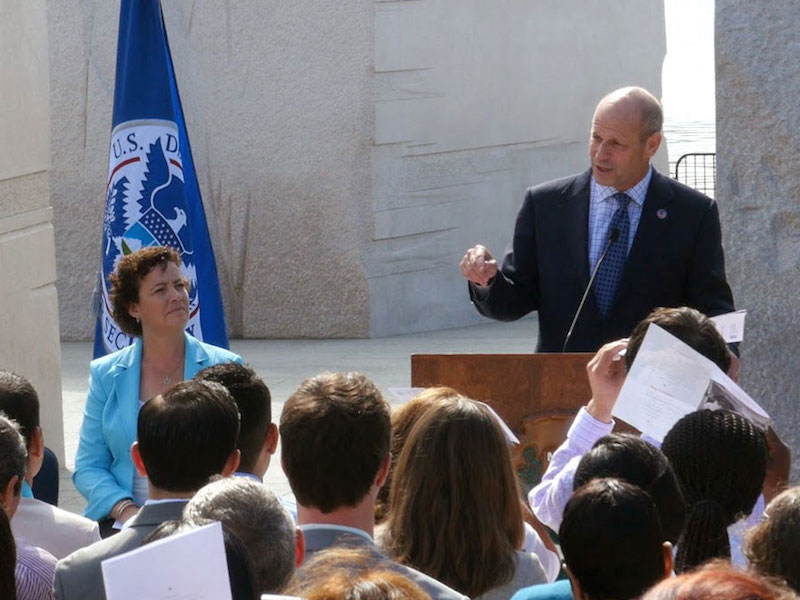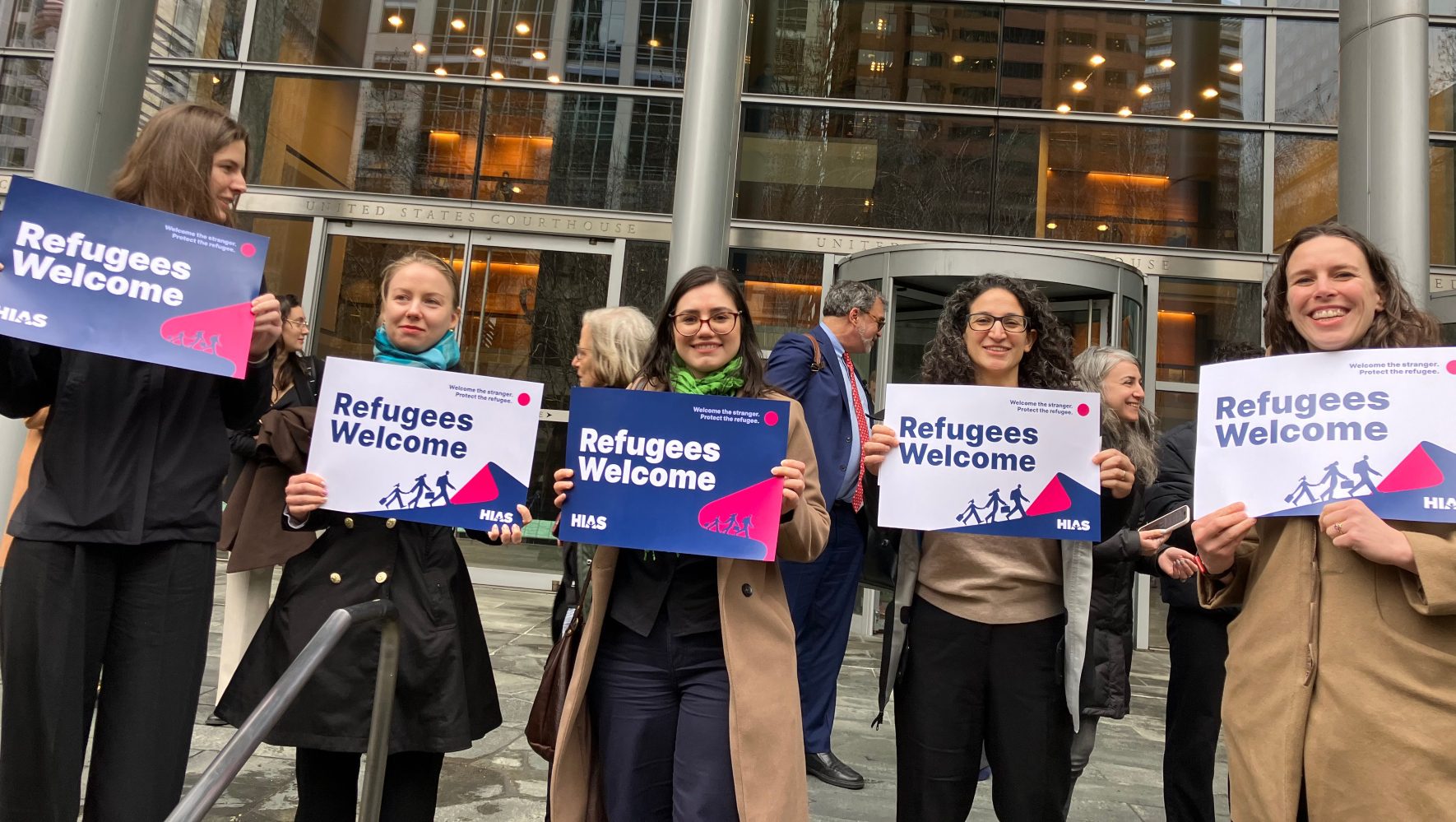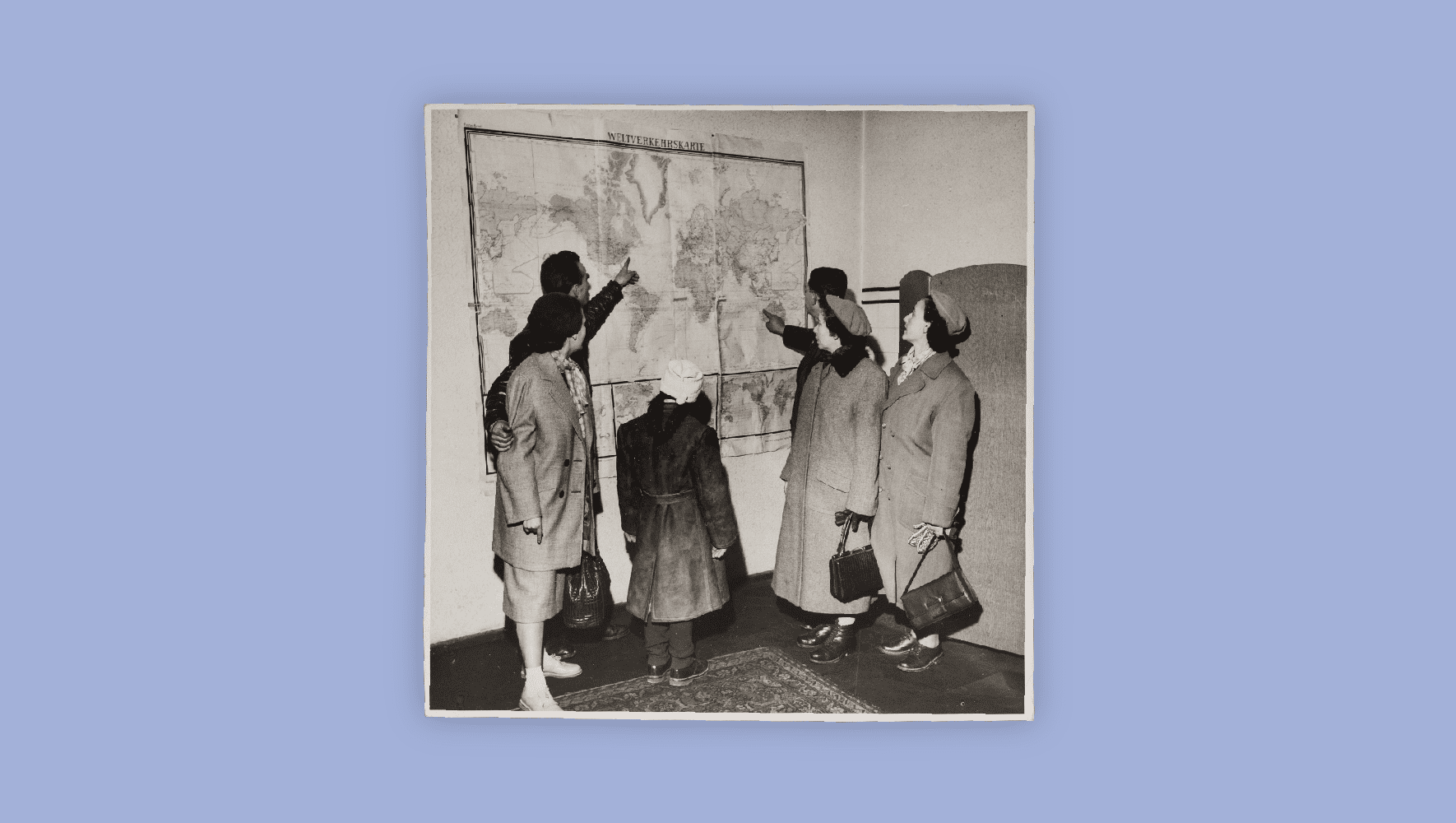Jewish American History Month Profile: USCIS Director León Rodríguez
May 11, 2015

USCIS Director León Rodríguez welcomes new citizens during a naturalization ceremony in Washington, D.C., Aug. 28, 2014.
(USCIS Photo)
To mark Jewish American Heritage Month, HIAS.org spoke with noteworthy Jewish-Americans with a refugee background. The first in this series features León Rodríguez who since July 2014, has been Director of the U.S. Citizenship and Immigration Services, part of the Department of Homeland Security.
Rodríguez, 52, whose grandparents fled anti-semitism in Poland and Turkey and lived in Cuba before resettling in the U.S., has had a long government career, serving as the director of the Office for Civil Rights at the Department of Health and Human Services and chief of staff and deputy assistant attorney general for civil rights at the Department of Justice.
In this interview (conducted via email), Rodríguez spoke of his experience at USCIS thus far, his perspective as the grandson of refugees and what it means to be a Latino Jewish-American.
You’ve been Director of the U.S. Citizenship and Immigration Services since last July, what have you found to be the most challenging and most satisfying aspects of the job so far?
The most challenging aspect of the job – but also the essence of what it means to do a job like this one – is finding that exactly right balance between your aspirations and what is feasible from an operational, financial, political and legal perspective. Right now, the best example of the search for that balance is our work in the area of deferred action. A tremendous amount of very careful thinking has gone into how to best build and implement that program.
There are two images that leap to mind when asked about the most satisfying aspects of the job. First, is the look of pure joy of new Americans and their families when we hold a naturalization ceremony, particularly when I administer the Oath of Allegiance. That experience will never get old for me. The second image is of those stakeholder engagements when you are able to make someone who believes the “system” doesn’t see them realize that in fact, we do genuinely care about helping them with all the tools we have.
What would you like to achieve as Director of USCIS?
Knowing that you have a limited time as a political appointee, it’s important to know with clarity what your goals are and what your path is to realize those goals. I have two external goals and two internal ones. From an external perspective, I want to fully implement the President’s Executive Actions on Immigration, which – in the absence of Comprehensive Immigration Reform by Congress – I believe is our best way to administer existing immigration laws in the manner most consistent with our national interests and values. While we are currently under an injunction on some aspects of the Executive Action, we continue to move forward on other parts to make our system more just and fair under our existing authorities.
Also, I want to ensure that we operate our refugee and asylum programs in a way that fully honors our humanitarian values as Americans, while also zealously safeguarding our national security. Internally, I want to continue to grow the already high-level of customer service that USCIS offers, and I want to make the greatest strides I can in modernizing our businesses process and technology infrastructure.
Your grandparents fled anti-Semitism in Poland and Turkey, and your family eventually made their way to the United States from Cuba. How has being the child of refugees affected your identity? How does it affect the way you approach your job?
Being a child of refugees is core to my identity and helps me appreciate the personal journey of USCIS customers. The pain and the fear that lead refugees to choose to leave their countries, and the profound sense of loss that follows is something I have thought about my whole life. My maternal grandfather John Policar was a HIAS volunteer in Havana during the wave of Jewish migration that followed Fidel Castro taking power. He died of illness before he was able to migrate himself, but I was raised on stories about him and of what families endured during that very difficult period. I am told I resemble him – both in appearance and personality.
It also means that on a very personal level, I understand and feel how huge the forces are that cause people to migrate, and I also understand the hopes and dreams they bring with them. Open any immigration file and you will see the story of some family’s sufferings, hopes and dreams. I want to make sure that basic insight informs everything we do here, and that we not get lost in the mechanics of what we do.
[[{"fid":"972","view_mode":"default","fields":{"format":"default","field_file_image_alt_text[und][0][value]":"President Obama and USCIS Director Leon Rodriguez, Feb 2, 2015. (Jetta Disco/DHS)","field_file_image_title_text[und][0][value]":"President Obama and USCIS Director Leon Rodriguez, Feb 2, 2015. (Jetta Disco/DHS)"},"type":"media","attributes":{"alt":"President Obama and USCIS Director Leon Rodriguez, Feb 2, 2015. (Jetta Disco/DHS)","title":"President Obama and USCIS Director Leon Rodriguez, Feb 2, 2015. (Jetta Disco/DHS)","style":"line-height: 20.7999992370605px; height: 400px; width: 600px; margin: 5px 10px; float: right;","class":"media-element file-default"}}]]
Historically, communities in the U.S. have been open to receiving resettled refugees but in the past few years, high unemployment rates, budget shortfalls and anti-immigrant laws have led some communities to begin to question the costs of resettlement and oppose the arrival of new refugees. What can be done to stem and even reverse this trend?
We cannot be reticent about telling the stories of refugees, because they are no less compelling now than they were when my family came to the U.S. It’s convenient for some to think of refugees as “grifters” of some sort, but if you really look at what’s going on, you realize there is just so much need and suffering in these communities. I also think we need to remember what our faith traditions have to say about this; they are very clear in their command – Va’ahavtem et ha-Ger – to “love the stranger.”
You have an uncommon mixture of Eastern European, Middle Eastern and Latino heritage. What is the Jewish-American experience like through a Latino prism?
Funny thing – growing up I didn’t think my heritage was uncommon. I grew up in a community and went to a synagogue where a lot of people were a lot like me. We weren’t really a mixture, as much as one community that has migrated through many different countries and cultures. I didn’t realize how unique that background was until I left home to go to college. And that in turn has made me realize what a special gift I have been given coming from such a community. To be honest, I think my Jewish heritage and faith and American values are the lens through which I view my family’s history and the world I live in now. Living as Jews in the Diaspora created for many of us (in my extended family) a sense of respect and openness to all cultures and nationalities, a perspective that is also found throughout the Torah.
That said, growing up in the Cuban Jewish community in South Florida was really something special. We were and still are fiercely tied to our Jewishness, but also very much connected to our Cuban world as well. For starters, consider that our life cycle events came with all the joy of a Jewish wedding or Bar/Bat Mitzvah, alternating with infectious salsa rhythms. On a more serious level, these roots have given me a strong sense of commitment to the broader Latino community in the U.S., whose stories echo so much of what the Jewish-American community experienced throughout its own history.
Did you have a Jewish-American hero or role model growing up? Do you have one now?
I have had a few Jewish-American heroes along the way. Growing up, I read and re-read the book The Grandees by Stephen Birmingham, which told the stories of Sephardic Jews early in our country’s history. I was particularly inspired by the stories of Haym Solomon and Admiral Uriah P. Levy. Haym Solomon was an early member of the Sons of Liberty at the beginning of the American Revolution and went on to support the founding of our country both militarily and financially. Uriah P. Levy was an American military hero who served in the Barbary Wars and the War of 1812 notwithstanding extreme anti-Semitism in the U.S. Navy at the time. He was responsible for the abolition of flogging in the U.S. Navy. A more current hero for me is the late Rabbi Marshall Meyer, formerly the rabbi of Congregation B’nai Jeshurun in New York City. Rabbi Meyer lived in Argentina during the time of the “Dirty War” and was active in opposition to the juntas. My wife and I visited B’nai Jeshurun a few times when we lived in New York, and it was through his sermons and his life story that I began to see the connections between Jewish teaching and political activism.
If you missed the other piece in our Jewish American Heritage Month series, an interview with Lenny Krayzelburg, a HIAS client during the last great wave of Soviet Jewish migration who became a four-time Olympic gold medalist for the U.S., check it out here.



